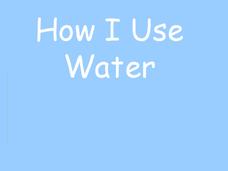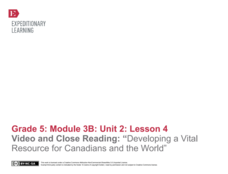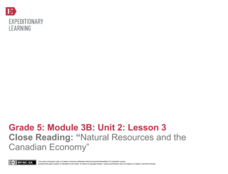Education World
Edible Resource Maps!
Young scholars discuss resource maps and examine examples from library resources. Working in groups, they create edible resource maps by drawing examples, such as popcorn on the border of Iowa and Nebraska. Then they use cookies in the...
Curated OER
Our Natural Resources
Your class will learn about natural resources and man-made items and differentiate between them. They chart resources from seven pictures and explain how each natural resource is used.
Curated OER
Our Natural Resources
Soil, water, fish, wildlife and forest are the main resources that are reviewed in this PowerPoint. Overuse and waste versus the value of the resources used and the long-term impact is covered in this clear presentation. It would be good...
Curated OER
Renewable vs. Non-Renewable Resources
Fifth graders are introduced to the important topic of renewable, and non-renewable, resources. They are expected to be able to correctly categorize different types of resources as renewable or non-renewable. Another emphasis of this...
Curated OER
Using Por and Para
Clear up confusion around por and para. These words can be very difficult, especially for learners who are native English speakers. The information section describes when to use each word and provides examples of specific situations....
Corbett Maths
Enlargements Using Ray Method
Figure out what to do when there is no grid to count. Using a ruler and a sharp pencil, the narrator shows how to perform a dilation when the figure is not on a grid. The ray method works by drawing a ray from the center of dilation...
American College of Sports Medicine
Selecting and Effectively Using Hydration for Fitness
How much water does your body lose during exercise? How much should you hydrate during and after exercise? Address the importance of hydration with your young athletes using this informative handout.
Curated OER
The Use of Language in "I Know Why the Caged Bird Sings"
Readers of I Know Why the Caged Bird Sings are asked to craft an essay in which they compare how Maya Angelou uses figurative language to depict herself and Mrs. Flowers.
EngageNY
Mid-Unit 3 Assessment Part 1: Researching Information about Buying Fish Caught Using Sustainable Methods
Sustainable seafood is not an oxymoron. Pupils watch a video about how consumers purchase seafood responsibly. Then, using resources in their assessment research folders, they complete a graphic organizer to record factual information...
Curated OER
How I Use Water
Beginning with a brief anticipatory set on how water is commonly used, this presentation evolves into a well planned lesson on the water cycle. Students will discuss vocabulary, label the parts of the water cycle, locate where water is...
Baylor College
How Do We Use Water?
Send youngsters home to survey how they use water in their homes. Then bring them together to discuss which uses are essential for our health and which are not. A helpful video offers teaching tips for this lesson, and a presentation...
Institute for the Professional Development of Adult Educators
Using Context Clues with Signal Words
When you come across an unfamiliar word in a text, do you skip it and move on? Practice using context clues to identify words you don't know with a thorough set of language arts lessons. The resource reinforces close reading and critical...
Overcoming Obstacles
Using Appropriate Resources
A lesson dives deep into reference materials. The class begins with a discussion of which resources are best used for specific purposes and how to identify ways to get the needed information. Learners share information about the internet...
Curated OER
Pollution and Environmental Studies- Daily Water Use
In this environmental studies worksheet, students create a data table to discover how much water each person uses on a daily basis and what it is used for. They complete a post activity to make and test solutions for pollution using a...
Curated OER
How Do We Use Resources & Energy?
Students research the cost of energy waste. In this resources and energy lesson, students study statistics on the use of plastic bags and calculate the cost of making plastic bags. Students investigate how they can save natural resources...
Code.org
APIs and Using Functions with Parameters
Introduce your class to the API, a reference guide that lists and explains the functionality of programming language. Using JavaScript, individuals draw complex designs that require additional commands and parameters defined in the API...
Texas Education Agency (TEA)
Investigating Careers Using O*NET
Let's investigate! Scholars use the O*NET website to investigate career options and complete a scavenger hunt. They also embark on an in-depth career project, researching three careers and then preparing a cover letter, resume, letter of...
Teach Engineering
Making Model Microfluidic Devices Using JELL-O
Nothing flows like J-E-L-L-O! In the final portion of a four-part series, pupils create scale models of microfluidic devices out of gelatin and bendable straws. They use their devices to test various flow rates in the delivery of...
Project WET Foundation
Use Water Wisely
What's the point in saving water? Surprisingly water isn't a forever resource because it is a natural resource. Here, young water conservationists hunt for 23 wise water users and water wasters by clicking on the people in the...
Annenberg Foundation
America's History in the Making: Using Digital Technologies
How can digital technology of today link us to the events of the past? Scholars use technology to uncover the vast number of historical resources available in lesson 12 of a 22-part America's History in the Making series. Using databases...
Curated OER
The Case of Vanishing Farmland
High schoolers consider decisions about how to use resources that are in short supply. Students role-play different perspectives in a land-use simulation, and examine land use issues around the world. This interesting instructional...
EngageNY
Video and Close Reading: “Developing a Vital Resource for Canadians and the World”
Scholars watch Developing a Vital Resource for Canadians and the World to learn about the supplement potash that helps plants grow. They watch the video several times, completing a note catcher to record key ideas along the way. Pupils...
EngageNY
Close Reading: “Natural Resources and the Canadian Economy”
Readers continue to learn how natural resources are important to Canada's economy. They read, annotate, and answer text-dependent questions about Natural Resources and the Canadian Economy. They then discuss key terms in the text.
Baylor College
Fossil Fuels and the Carbon Cycle
Humans are quickly depleting Earth's fossil fuels and locating them is becoming increasingly difficult! Layered muffins are used for models as young geologists take core samples in order to determine the presence of oil. Consider first...
Other popular searches
- Using Resource Materials
- Using Resource Wisely
- Using Resources Wisely
- Life Skills Using Resources
- People Using Resources

























